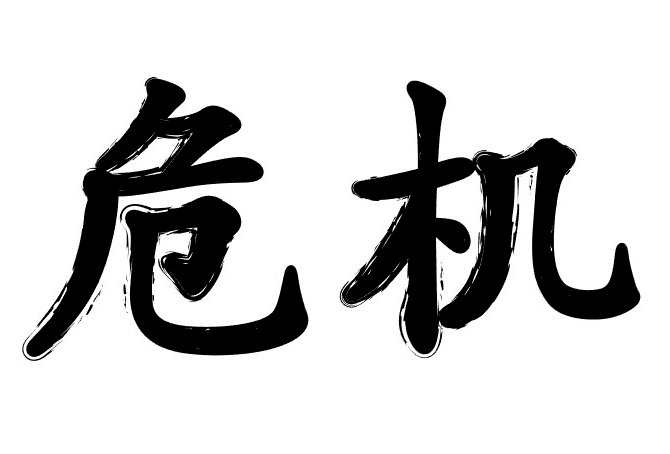On the Internet you can often find a motivating story about the Chinese word “crisis”, which encourages you to look at difficult times with optimism. We checked how true this etymology is.
A vivid rhetorical formula with supposedly Chinese roots is used in a variety of situations: from motivational publications on social networks before materials with advice from a psychologist on how to cope with a difficult situation. When in 2020 the world was faced with a coronavirus, which also came from China, the phrase about the Chinese character for “crisis” simply could not help but be mentioned. For example, with the statement “As you know, the word “crisis” in Chinese is denoted by the characters “danger” and “opportunity”” begins article in the magazine “Business Petersburg” about the decrease in the flow of tourists from the Middle Kingdom. A story about this word uses in his article on development prospects in a pandemic and Gleb Ivashentsov, former Russian Ambassador to Myanmar and Korea, Vice President of the Russian International Affairs Council.
The inspiring story of the Chinese word for "crisis" was made popular by US President John F. Kennedy. A year and a half before his election, during a speech in Indianapolis, the politician said: “The word “crisis” written in Chinese consists of two characters: “danger” and “opportunity”.” Subsequently, other American politicians began to use this catchy phrase: for example, ex-Secretary of State Condoleezza Rice and former vice president Al Gore.
Benjamin Zimmer, an American linguist and lexicographer who has collaborated over the years with Oxford University Press, The Wall Street Journal, The New York Times Magazine and The Atlantic, became interested in the history of this phrase. In his article he reports, that it was not Kennedy who came up with this “interpretation” of the Chinese word “crisis”. It appeared at least 20 years earlier in a magazine for missionaries traveling to China. Two years later, the then popular journalist Dorothy Thompson used the expression in her article, and in 1952 it was mentioned by Secretary of State John Dulles, the elder brother famous to every self-respecting conspiracy theorist CIA director.
From a philological point of view, the Chinese word for "crisis" (危机, "weiji") is detailed disassembled in his essay, University of Pennsylvania professor Victor Mair. As the scientist explains, this word actually consists of two characters: 危 (“wei”) and 机 (“ji”). The first of them really means “dangerous, unreliable,” but the second is much more ambiguous. According to Mair, the most accurate translation of 机 (“ji”) is “point of change, decisive moment.” That is, in Chinese, the literal meaning of the word “crisis” is “a dangerous moment when everything starts to go differently, awry.” In Chinese, “opportunity” is 机会 (“jihui”); The character 机 (“ji”), which in itself does not have such a meaning, is included in this word, which could mislead people. "Crisis - Not moment when someone is looking for advantages and benefits! - concludes Mair.
Wu Hong from the University of Chicago asserts, that the word 危机 (“weiji”) in Chinese did not mean “crisis” for quite a long time. The professor agrees with his colleagues that the character 机 (“ji”) has many meanings, including “opportunity” and “danger.” “When the Chinese began using the word 危机 (weiji) in the 3rd century, they simply meant danger, a meaning that was emphasized by both characters,” says Wu Hong.
Alexey Maslov, professor at the School of Oriental Studies at the National Research University Higher School of Economics and acting director of the Institute of Far Eastern Studies of the Russian Academy of Sciences, also agrees with American sinologists. Based on ancient Chinese texts, he asserts, that originally 机 (“ji”) is “mechanism”, “spring”. Maslov suggests: “Most likely, the earliest meaning is the trigger mechanism of a crossbow or crossbow.” At the same time, the scientist emphasizes that “convenient moment, chance” is one of the “minor and later meanings” of this hieroglyph, and considers the most accurate literal translation for the word “crisis” (危机, “weiji”) to be the expression “trigger moment to danger.”
The speech of Chinese President Xi Jinping could cast doubt on the above assessments of philologists. During an inspection tour of Zhejiang province shortly after the outbreak of the coronavirus crisis, the Chinese leader spoke that “danger and opportunity always coexist - it is by overcoming danger that opportunity appears.” The experts we interviewed from the Department of Oriental and African Studies at the National Research University Higher School of Economics in St. Petersburg explained that Xi Jinping’s statement contains “a very characteristic play on words for the Chinese language, but this does not at all imply that the hieroglyphs in the word 危机 (“crisis”) now mean “danger” and “opportunity”” (and the head of the PRC himself did not claim this). The scientists suggested that “the popularized idea fell on the hearts of the Chinese, they appropriated it and repeat it with pleasure,” but emphasized that this fact does not change the morphemes that make up the word “crisis” and their basic meanings.
We thank the senior lecturer at the Department of Oriental and African Studies at the Higher School of Economics in St. Petersburg Ekaterina Starikova for assistance in preparing the material.
Mostly not true
- http://itre.cis.upenn.edu/~myl/languagelog/archives/004343.html
- https://www.studychinese.ru/articles/4/186/
- http://pinyin.info/chinese/crisis.html
- https://amaslov.me/ru/blog/danger-opportunity/
- https://www.papahuhu.com/archive/202005035636/
If you find a spelling or grammatical error, please let us know by highlighting the error text and clicking Ctrl+Enter.







